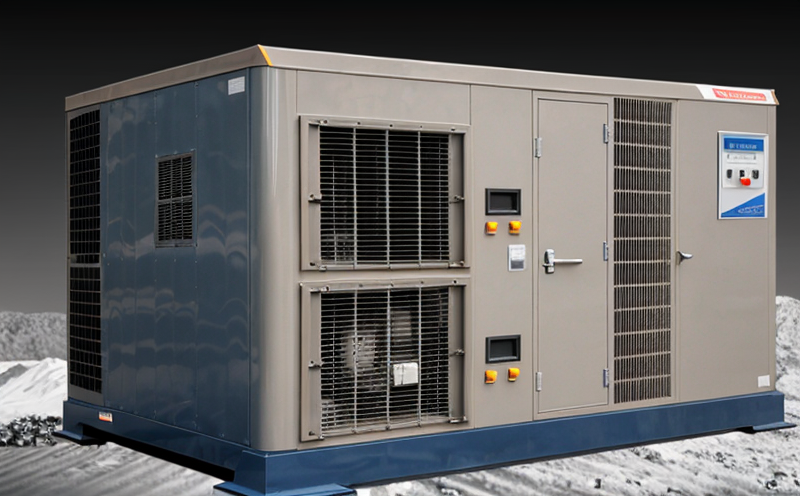ASTM E1461 Thermal Diffusivity by Laser Flash Testing
The ASTM E1461 standard outlines a method for determining thermal diffusivity using laser flash analysis, which is crucial in the semiconductor and microchip testing sector. This technique involves measuring how quickly heat spreads through a material under controlled conditions. The process is non-destructive and provides insights into the thermal properties of materials, ensuring they meet performance standards required for reliable operation.
Thermal diffusivity plays a significant role in the design and manufacturing processes of semiconductors and microchips. Understanding these properties helps engineers optimize the layout of components to minimize heat buildup and improve overall system efficiency. By accurately measuring thermal diffusivity, manufacturers can enhance product performance, extend lifespan, and ensure compliance with industry standards.
The laser flash method involves illuminating a small area of the sample with intense light for an extremely short period (typically less than 1 millisecond). The resulting temperature rise is measured using high-speed infrared sensors. This rapid measurement allows for precise determination of thermal diffusivity, even in thin or complex materials.
Compliance with ASTM E1461 ensures that the testing process adheres to internationally recognized standards, providing a consistent and reliable means of evaluating material properties. For quality managers and R&D engineers, this service offers critical data for optimizing designs and ensuring product integrity. By leveraging laser flash technology, businesses can enhance their competitive edge by producing high-performance components.
The ASTM E1461 method is particularly useful in the semiconductor industry where thermal management is paramount. Microchips generate significant heat during operation, which must be efficiently dissipated to prevent overheating and potential failure. Accurate measurement of thermal diffusivity allows for better thermal design, leading to longer-lasting and more reliable products.
Furthermore, this testing method supports compliance with regulatory requirements such as the International Electrotechnical Commission (IEC) standards. By adhering to these standards, manufacturers can ensure their products meet global quality benchmarks, facilitating easier market entry and broader customer acceptance.
Industry Applications
| Application | Description |
|---|---|
| Semiconductor Manufacturing | Assessing the thermal stability of materials used in microchip design and manufacturing. |
| Microelectronics Testing | Evaluating the performance of electronic components under varying thermal conditions. |
| Material Development | Optimizing material properties for improved heat dissipation and enhanced performance. |
| R&D Innovation | Supporting research into new materials with superior thermal characteristics. |
| Quality Assurance | Ensuring consistent quality across batches of components by verifying thermal diffusivity. |
| Regulatory Compliance | Aiding compliance with international standards for electronics and semiconductor products. |
| Environmental Stress Testing | Evaluating the ability of materials to withstand extreme environmental conditions, including temperature fluctuations. |
| Product Reliability | Determining the long-term performance and reliability of electronic components under thermal stress. |
The ASTM E1461 method is widely utilized in these applications due to its precision and efficiency. It enables manufacturers to make informed decisions about material selection, design optimization, and quality control, ultimately leading to the production of more reliable and efficient semiconductor devices.
Quality and Reliability Assurance
- Precision Measurement: The laser flash method provides highly accurate measurements of thermal diffusivity, ensuring consistent results across multiple samples.
- Rapid Testing: With minimal sample preparation required, testing can be completed quickly, allowing for efficient quality control processes.
- Non-Destructive: The method does not alter the properties of the material being tested, maintaining its integrity for further analysis or use.
- Data Reproducibility: Results are consistent across multiple tests, providing reliable data for quality assurance and product development.
- Regulatory Compliance: Testing according to ASTM E1461 ensures that products meet international standards and regulations.
- Thermal Stability Verification: By measuring thermal diffusivity, manufacturers can verify the stability of materials under various thermal conditions.
- Component Durability: Assessing thermal properties helps in understanding how components will perform over time, contributing to improved reliability.
The ASTM E1461 laser flash testing method is a cornerstone for quality and reliability assurance in the semiconductor industry. Its ability to provide precise, reproducible, and non-destructive measurements ensures that manufacturers can confidently produce high-quality products that meet rigorous standards.
Environmental and Sustainability Contributions
The ASTM E1461 laser flash testing method contributes positively to environmental sustainability by enabling the development of more efficient and durable semiconductor devices. By improving thermal management, these devices consume less energy and generate less waste during operation. This efficiency not only reduces operational costs but also minimizes environmental impact.
Additionally, the precise measurement provided by this method helps in optimizing material use, reducing unnecessary resource consumption. The ability to select materials with optimal thermal properties allows for more sustainable product design, aligning with global sustainability goals.
The testing process itself is environmentally friendly due to its non-destructive nature and minimal waste generation. This contributes to a cleaner production environment, supporting the overall objectives of environmental stewardship in manufacturing processes.





